28+ Sample Coaching Contracts
-
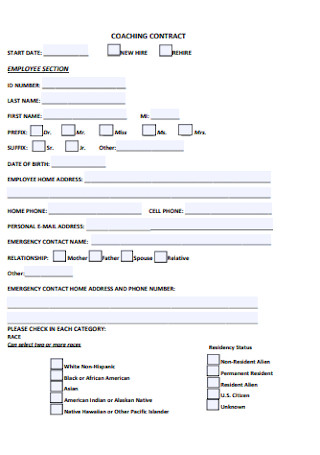
Sample Coaching Contract
download now -
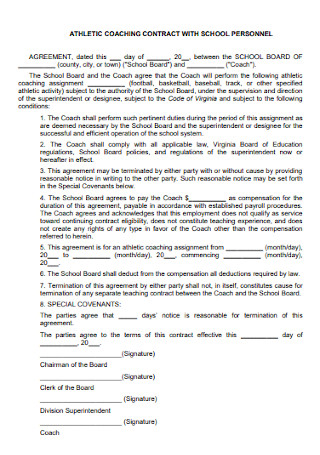
Athletic Coaching Contract
download now -
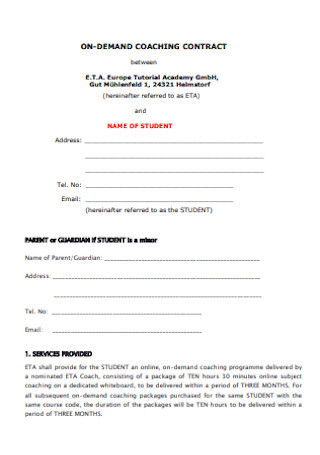
On Demand Coaching Contract
download now -
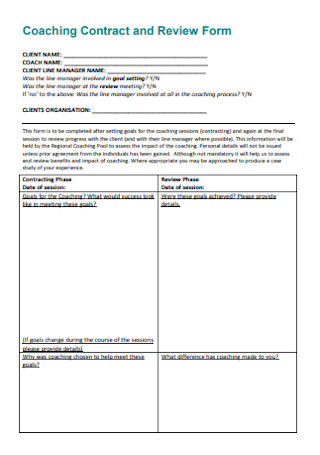
Coaching Contract and Review Form
download now -
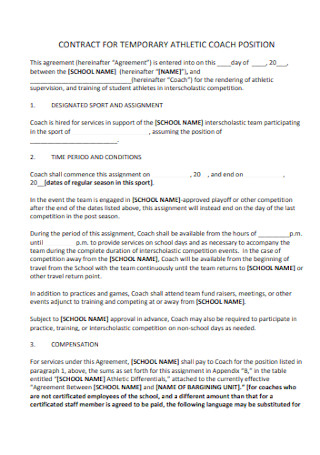
Contract for Temporary Athletic Coach
download now -
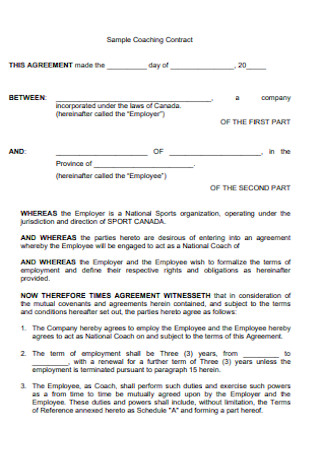
Sample Coaching Contracts Template
download now -
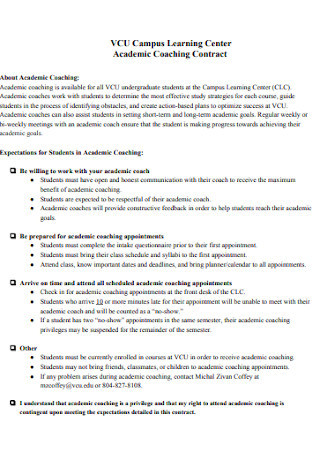
Academic Coaching Contract
download now -
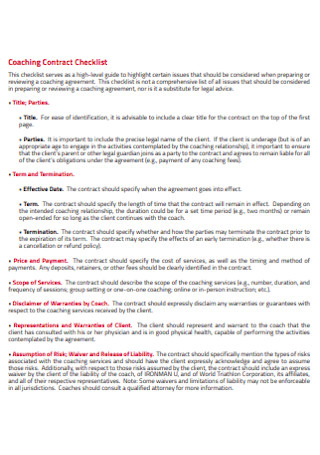
Coaching Contract Checklist
download now -
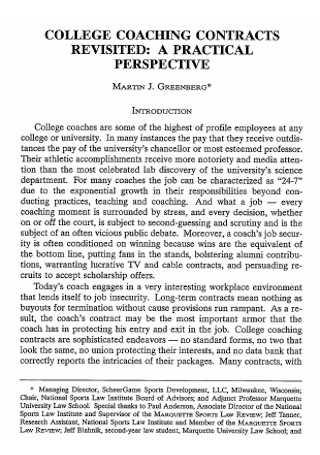
College Coaching Contract
download now -
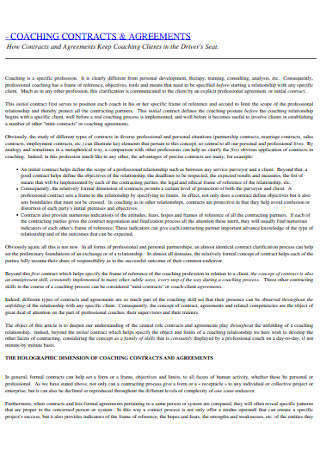
Coaching Contract and Agreement
download now -
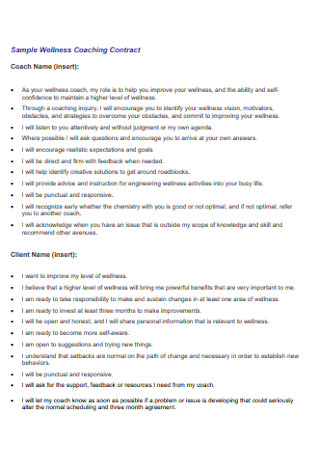
Sample Wellness Coaching Contract
download now -
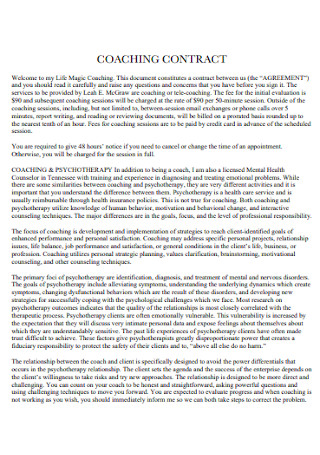
Magic Coaching Contract
download now -
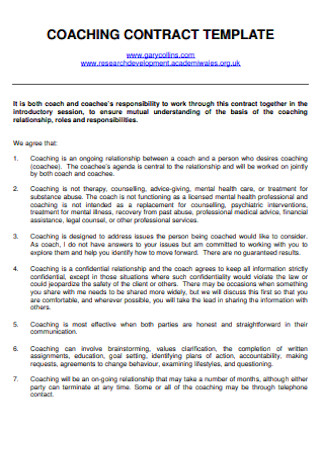
Standard Coaching Contract
download now -
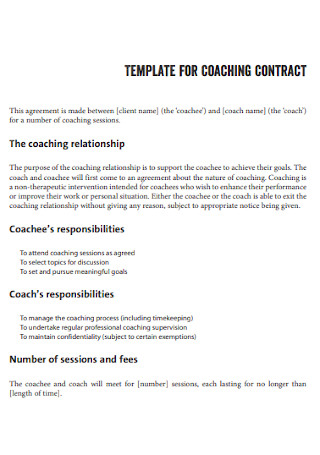
Template for Coaching Contract
download now -
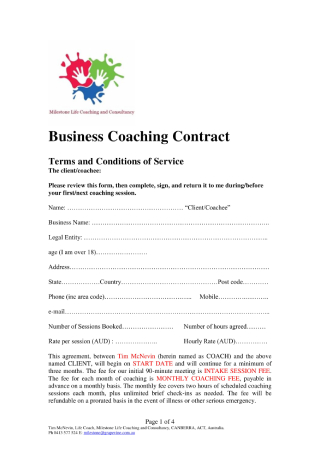
Business Coaching Contract
download now -
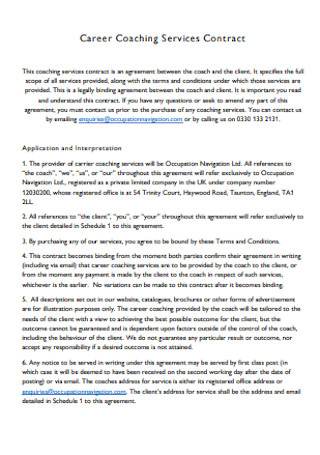
Career Coaching Services Contract
download now -
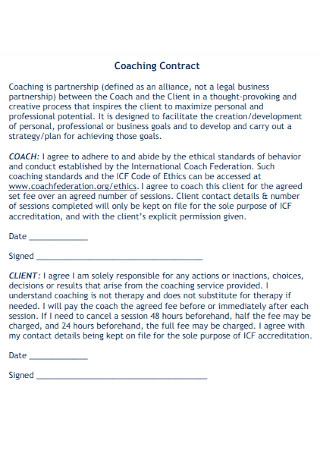
Coaching Contract Format
download now -
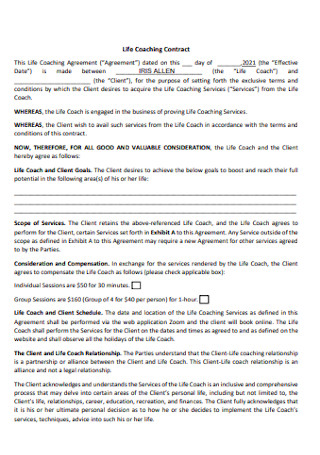
Life Coaching Contract
download now -
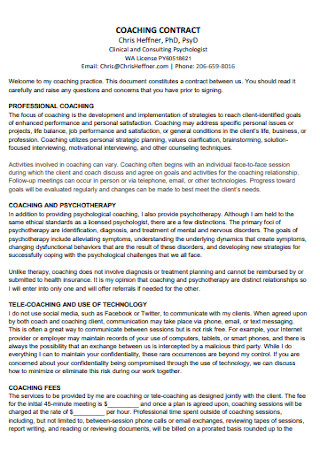
Clinical Coaching Contract
download now -
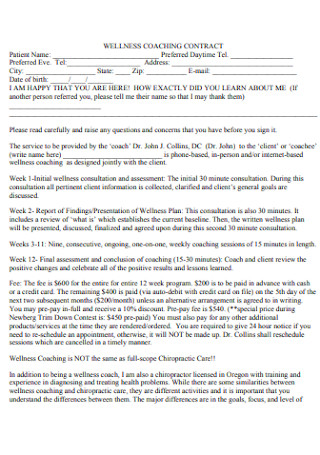
Wellness Coaching Contract
download now -
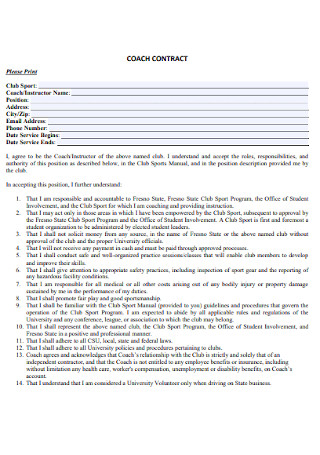
Standard Coach Contract
download now -
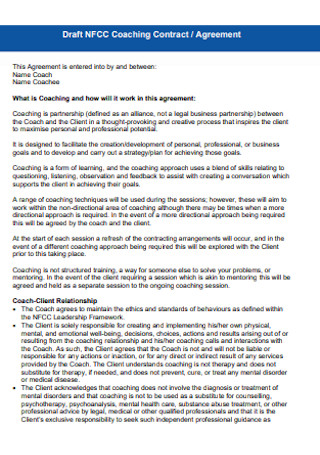
Coaching Contract and Agreement Template
download now -
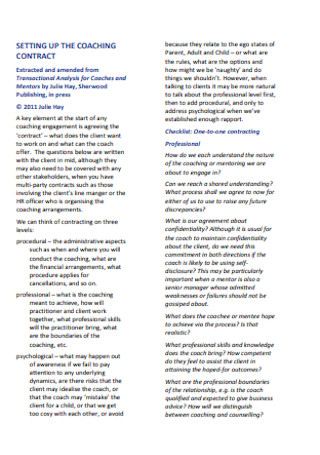
Formal Coaching Contract
download now -
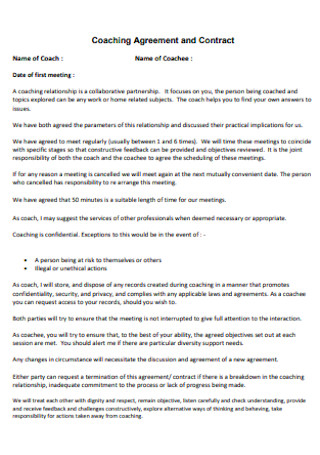
Sample Coaching Agreement and Contract
download now -
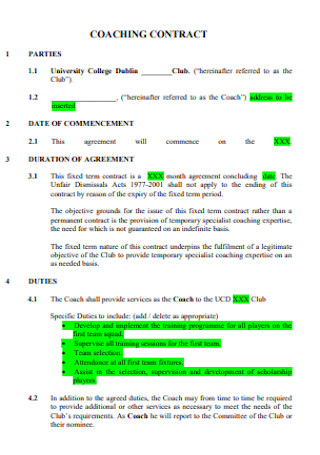
Sample College Coaching Contract
download now -
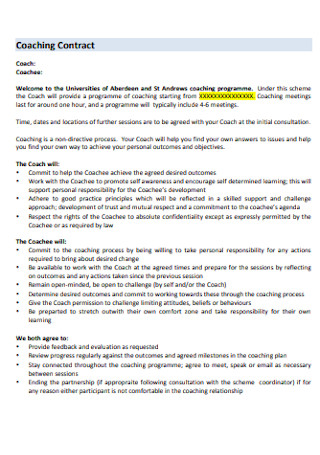
University Coaching Contract
download now -
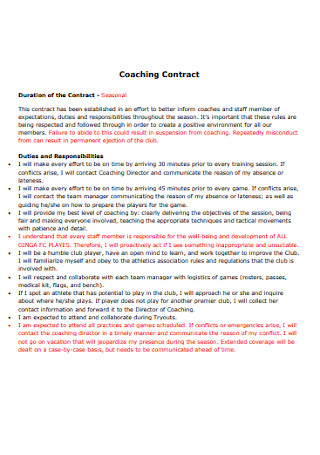
Professional Coaching Contract
download now -
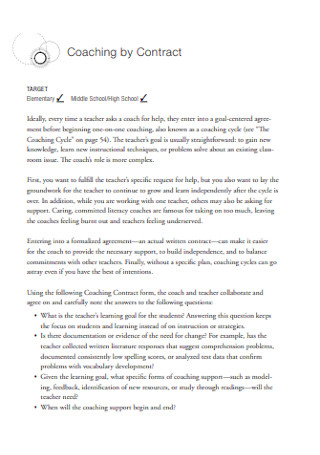
School Coaching by Contract
download now
FREE Coaching Contract s to Download
28+ Sample Coaching Contracts
What Is a Coaching Contract?
Components of a Coaching Contract
How to Enforce Coaching to Employees
FAQs
What is the difference between coaching, teaching, mentoring, and counseling?
Why is there a need for a coaching contract?
How long should coaching contracts last?
Through these organizations, the biggest and most famous names in the sport begin to build recognition globally. It is why plenty of athletes start from a young age with parents already recognizing their skills. However, despite their incredible talents, most hire experts to train them to reach their full potential. The construction of coaching contracts supports proper arrangements between the client and a coach. These contracts also apply widely in the business setting. Learn more about these types of documents, including their definition, components, and creation. Continue reading through the article for further details.
What Is a Coaching Contract?
A coaching contract is a legal agreement that sets the tone of a coaching relationship between a coach and a client. The contract helps both parties to have a common understanding of the expectations and objectives throughout the journey. A written and signed coaching contract helps an instructor to get out of difficult situations with the client. Drafting the contract happens before any coaching activity begins. Coaching, in itself, is a profession that centers on the processes involving clients. In which case, the coach is an added value to the whole method. Keeping professional objectivity in a closely-knit relationship structure can be challenging in the long run. Coaching contracts generally establish what kind of relationship the client and coach have, and it details it on the written document.
An article published by the International Coaching Federation posted on January 2021 regarding coaching trends, an increase in demand for coaching service will prosper in the following years. In 2019 alone, the estimated market size of the coaching industry produced a total of 15 billion US dollars, with 7.5 billion US dollars belonging to the United States.
Components of a Coaching Contract
Several essential elements must be present in a coaching contract. The creation of the contract relies on what the initial agreement is between the client and the coach through previous professional conversations. The idea is to refine these agreements as you along from one client to another. However, the following components are necessary for any coaching contract that a coach and client write.
How to Enforce Coaching to Employees
Consistent coaching enables employees with retention, skill and performance improvement, and knowledge transfer. Leaders that coach their employees instead of commanding them builds a much more talented and agile workforce that helps businesses into a healthy and growing business. Here are helpful tips that aid in improving overall team performance:
Tip 1: Ask the Right Questions
Open-ended questions lead to more detailed and thoughtful answers and a more productive coaching conversation. As a manager or a team leader in management, you must establish and develop a strong bond with your employees. Doing so helps you determine whether your employees can learn, improve, and perform with the right attitudes towards their work. In doing this step, managers must possess and use their communication skills and emotional intelligence. It enables them to guide conversations through active listening and speaking and not by giving derivatives. Your employees will learn and grow efficiently if they answer all the questions at their own pace.
Tip 2: Recognize What Works for Employees
A balance of constructive criticism and praise make up the process of coaching. Coaching conversations that are too focused on what needs to change without giving a proper solution is not ideal, and it will sound demoralizing to employees. Recognizing the things that your employees do well can be an initial step for them to build and improve themselves. It is necessary to remember that giving empty compliments can have a negative effect than not giving any. Take the time to process things that work for your employees and let them know that you appreciate them for it. Also, consider the way certain employees would like to get recognized. It’s nice to sit with your employees individually and learn if receiving praise helps them stay motivated. It’s also necessary to know if they prefer private or public recognition, to make sure you don’t embarrass any of your employees.
Tip 3: Learn to Listen and Empower Employees
Proper coaching entails both encouragement and empowerment. As a manager or team leader, it is one of your tasks to hold a good relationship with your employees or team members. Having this will be easier for you to see results and improve performance. Employees will have various inputs, questions, and feedback, and they need to know that you care about their opinions by listening. Encouraging them to share their thoughts and observations goes a long way. Some of your employees may have no problems speaking their minds; however, some will need plenty of encouragement. Once these individuals open up, together with your employees, take the time to listen and discuss these opinions with them.
Tip 4: Understand Everyone’s Perspective on Various Ideas
In coaching your employees, approaching things from their perspective helps enormously to see the changes and improvements you want. It’s also advantageous to know what motivates your employees, including their preferences, personalities. To get an idea of these, ask questions to comprehend the reason behind actions and understand what changes they prefer to happen. Only then can you create solutions for your coaching activities and conversations. Align the way your employees work with the improvements you both want to see. List out possible scenarios that involve how your employees would react in different settings. It would also help get simple feedback from the employees and learn from their experiences for the next time you have coaching activities. With these perspectives in mind, it allows managers and team leaders to work efficiently and effectively to get the result they need out of coaching.
Tip 5: Coach in the Moment Then Talk about the Next Steps
When employees come and approach you with opinions, questions, or suggestions about processes or protocols, utilize this opportunity to give advice and teach them something new. If you cannot accommodate their requests because of prior commitments or unfinished business, do no brush employees off. Instead, take the time to schedule them on a specific day as soon as you can. It is also advantageous to hold one-on-one weekly meetings for each employee, as it helps to go over questions or concerns regularly and at the same time maintain a productive day. It also shows your employees that you prioritize them daily. Coaching must also yield results and changes, so it’s best to have a distinct objective and outline at the beginning of sessions to know what the next steps are afterward. Creating a comprehensive roadmap ensures that you and your employee are on the same page with similar expectations, along with a clear recognition of what to do next. Also, guarantee that what happens next is mutually agreed-upon, giving a reasonable expectation regarding their workload and complexity of the improvements.
Tip 6: Commit to Continuous Learning
As a manager, setting a good example for your employees is one of the best coaching techniques you can do. Commit to improving your skills and other competencies each day. If you cannot do it, then why should the employees that you are coaching. Show your employees that seeing them succeed and reach their goals is an investment you want to witness. Ask relevant questions involving their roles and career growth with the company. Inquire about these topics will make them think about what they want to achieve in their careers and accomplish while staying with the company. Let your workers know that you are actively interested to see their growth, improvements, and accomplishments in their careers and professional success.
FAQs
What is the difference between coaching, teaching, mentoring, and counseling?
Despite sharing key characteristics and skills, coaching, teaching, mentoring, and counseling are different in their respective field. It is beneficial to recognize and be aware of these differences. Coaching involves the notion that individuals know the answer to the problems they are currently facing. The vital skill of coaching requires asking the right questions to help individuals work through their difficulties and obstacles. Teaching, on the other hand, involves authorized experts imparting their knowledge to other people. More often than not, there are definite answers to questions. Mentoring shows similarity to coaching. A mentor guides someone to learn or develop skills faster compared to doing it alone. Mentoring relationships focus on the future, career growth, and expanding an individual’s boundaries. Meanwhile, coaching tends to focus on the present and solve immediate issues and complications. Counseling is a more therapeutic intervention and focuses on past events to overcome fears, barriers, insecurities, and uncertainties to move forward.
Why is there a need for a coaching contract?
Coaching contracts serve as a necessary legal instrument for a coach and a client for two significant purposes. First, it sets the ground rules for the coaching relationship for the awareness of obligation by both parties. Secondly, it effectively minimizes disputes and misunderstandings that lead to liabilities of the coach. It gives both parties peace of mind and allows the coach to do their job to the best of their ability without worrying about legal consequences.
How long should coaching contracts last?
Coaching engagement varies depending on the business model, niches, coach’s specialty, and the client’s objectives. For short or fixed-length coaching contracts, the range is either three, six, or twelve months. Business, executive, career, and corporate coaching usually use this kind of coaching terms. Long or open-ended coaching is present in life coaching and other forms of personal coaching, such as health, restorative, development, and spiritual. The minimum lengths of these contracts are three months. Anything less than this, clients will see no progress, thus not wanting to continue with the program.
As human beings, we are wise and proud creatures. There are instances that we think of ourselves as someone who knows everything and that we could go through many things without needing anyone’s help. However, when hurdles are thrown your way and could not figure out how to get through them, it is okay to get help or advice. Coaching sessions are nothing to be afraid of as you come out of it with new skills and growth from when you start. As managers, you must know about your employee’s struggles and recognize them enough to offer help. In the words of Bill Gates, “It is fine to celebrate success, but it is more important to heed the lessons from failure.” Start to change for the better, both of yourself and your clients. After, look through the variety of coaching contracts above that is available for use and download.
